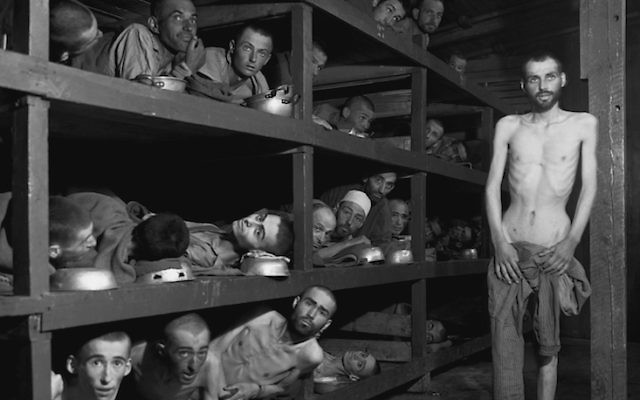Calling time on the Nazi slur
Question: What do George W. Bush, Barack Obama, Tony Abbott, Benjamin Netanyahu, Vladimir Putin, Donald Trump, Campbell Newman, Taylor Swift, Obamacare, abortion, gun control, stem cell research, animal rights, Australia’s immigration policies and detention camps, have in common?
Answer: they have all been compared to Hitler or have been Nazified.
It is the mother of all thoughtless analogies, comedic punchlines and clichés, tossed around carelessly and with infinite flexibility. And although we should know better, in today’s climate of hyperbole and cultural stupidity, anyone can be, or is, Hitler.
It seems that Hitler mania and delirium know no bounds and are an equal-opportunity slur. Nazis, who represent the ultimate evil, and conjure up the most horrific visions of suffering and depravity, are appearing in our culture with disturbing frequency and obscenely littering our public square.
We have soup Nazis, grammar Nazis, eco-Nazis, femi-Nazis, nico-Nazis, health Nazis, jazz Nazis, ticket Nazis, lunch-box Nazis and traffic Nazis, to name but a few. Consider, if all these people are Nazis, how terrible could the real Nazis have been?
The real Nazis must be delighted with these distortions. Social media has amplified the so-called Goodwin’s Law: “As online discussion becomes longer, the probability of a comparison involving Nazis and Hitler approaches one”.
I get why people are tempted to introduce Nazis into a discussion, why the appeal of invoking and exploiting this imagery is so powerful. The Third Reich embodies a unique historical evil, and is a convenient metaphor for illustrating the concept of right versus wrong.
It’s a cheap trick that packs a punch as a scare tactic, is hard to beat for shock value, and is guaranteed to work as a sensational headline generator.
It’s also an effective instrument in demonising and smearing anyone who you disagree with.
I acknowledge that sometimes people use the term Nazi to describe a person who is strict and uncompromising, an obsessive control freak. But there is a world of difference between such personality types and the human horror and unspeakable crimes of the Nazis in the 1930s and 1940s.
One does not need to be a professor of history to know that Nazi and Hitler analogies are revolting and repugnant, or that they belittle the indescribable atrocities carried out on an industrial, monstrous scale.
Just ask a Holocaust survivor and they’ll tell you that none of the comparisons today match or even come close to the immensity of the terrors and barbarity of Hitler’s Germany. Such a lazy reliance on irresponsible analogies makes a mockery of the slaughter of millions and is insulting and painful to the victims and to the survivors.
Such a lazy reliance on irresponsible analogies makes a mockery of the slaughter of millions and is insulting and painful to the victims and to the survivors. It also dishonours the enormous sacrifices made by those who fought to defeat the Nazis.
The problem is that when you remove the historical associations and meaning from the Holocaust you make it really hard to impart the timeless and universal lessons of this tragedy to current and future generations. Such trivialisations also make it easier for Holocaust deniers who bombard the internet with lies and Jewish conspiracies. The B’nai B’rith Anti-Defamation Commission has repeatedly spoken out against this kind of vile and ugly rhetorical device.
Whether it is politicians, academics or celebrities, we denounce them for their misguided and revolting equations, and for their disregard for the truth.
There is no excuse for public figures to play the Hitler card, to misuse this supercharged and insensitive language as a blunt tool to score political points. If you feel the urge to reference Hitler to stir the emotions and inflame the debate, or to win an argument, you are way out of line.
Watch your language and reflect deeply before grabbing the Hitler lexicon. Think about the systematic extermination of innocents, including more than one million children, about the emaciated figures staring from barbed wires, about the kids torn from their mothers’ arms and pushed into the gas chambers, about the crematoriums in Auschwitz, about the death marches, about the mobile killing units, about the ghettos, about the Roma, the mentally handicapped, homosexuals and others who were executed for being “different” and then stop and ask yourself whether the Nazi analogies you are about to spew out are appropriate.
During this year’s republication presidential race a host of commentators, opponents and comedians have rushed to equate Donald Trump with the Fuhrer. I shouldn’t have to say this, but although the billionaire businessman has said some troubling things and his ideas have rattled many as dangerous and bigoted, he is no Hitler.
The shoddy comparisons and name-calling are not connected to reality or the facts. Trump is not an anti-Semitic, butcherous dictator with a “Final Solution” to eradicate an entire race; he does not possess Hitler’s genocidal objectives; he has no authority over paramilitary style henchmen and storm troopers like Hitler did.
Our language has plenty of strong words to criticise his policies. As one who has devoted his life to fighting anti-Semitism and Holocaust denial, who has taught and written a book on the subject, I’ve had enough.
So let’s retire and bury, once and for all, the improper Hitler and Nazi references.
And to those who see me as a passionate guardian of Holocaust memory – they’re right.
Dvir Abramovich is the Israel Kipen Lecturer in Hebrew-Jewish Studies and Director of the Program in Jewish Culture & Society at The University of Melbourne. He is also chairman of the ADC.


comments